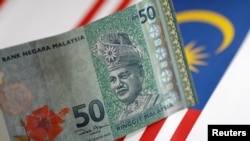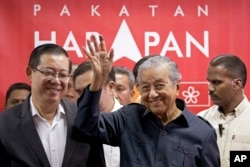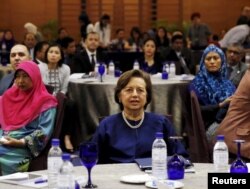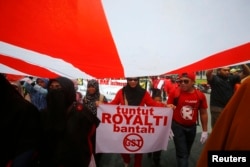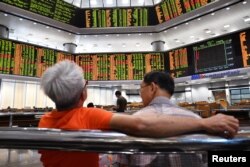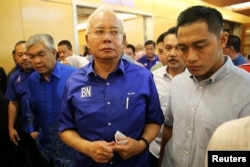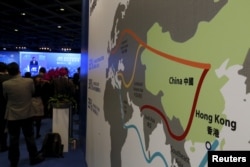Malaysia's new government to scrutinize past economic policies under the now ousted Najib Razak administration is prompting analysts to warn of a slide in investment and growth in one of Southeast Asia's top economies.
The new leadership has appointed a group of prominent citizens, an eminent persons group, to come up with a new policy agenda within the next 100 days that will, among other things, review mega investment projects that have been key drivers of economic growth.
The new government has also established a special task force as corruption allegations over the abuse of funds in a sovereign wealth fund set up by Najib, and ordered a review of political representation on Malaysia's largest government investment firms, including the main sovereign and pension funds.
Leading the eminent persons group is a former finance minister, Daim Zainuddin, and it includes a former central bank governor, Zeti Akhtar Aziz, a former president the Malaysian energy giant, Petronas, an economist and a leading businessman.
Gareth Leather, senior Asia economist for Capital Economics, an economic research group in London, says a key issue is whether Malaysia's new government will remain united in the face of moves toward economic reforms.
"[The coalition] when it was formed was very much a coalition against Najib rather than anything pro-reform. So the first real test they have got is to see if there is enough cohesion within that coalition to push through [economic] reforms," Leather told VOA.
A key campaign promise by new Prime Minister Mahathir Mohamad's Pakatan Harapan — or Alliance of Hope — was to abolish a value added, goods and services tax.
While the tax, known as GST, was unpopular among voters, analysts say the revenue enabled the government to diversify its tax base from an over-reliance on corporate tax and the oil industry.
Immediately after the vote, financial markets reacted nervously to the scrapping of the tax and questions of the impact the measure would have on the government's budget. Contributions from the GST have reached $10.6 billion.
Malaysian Finance Ministry officials have not said when the tax would be abolished, and analysts predicted a tough road ahead for the plan.
"To raise as much money as the GST while getting rid of the GST is going to be quite difficult. I don't think that they can really go ahead and form a U-turn a d decide to keep it — so it's going to be quite tricky managing it for them," Leather said.
Analysts say financial markets are also closely watching steps in the new investigations centered on former leader Najib, accused of siphoning off billions of dollars from the 1MDB wealth fund. He firmly denies the charges. The U.S. Department of Justice alleges some $4.5 billion was misappropriated from the 1MDB, originally set up by Najib.
At least six countries, including the U.S., Singapore and Switzerland, are investigating the allegations of corruption. The new government has vowed to undertake fresh investigations into the case. Last weekend Malaysian immigration authorities refused Najib and his family the right to leave the country pending the investigations.
Unlike abolishing the sales tax, Leather predicts the corruption investigations will have a positive effect on the economy.
"Hopefully what it will do is it will bring to light a lot of the problems, institutional problems that have been holding Malaysia's economy back over the past few years. It would have been shocking had Najib been able to steal this election," he said.
But observers say a review of the multi-billion dollar mega projects, especially those undertaken by China, may have a major impact. The Chinese have invested more than $3.38 billion in Malaysia — and China is the leading foreign investor ahead of the U.S., Japan and Singapore. Chinese investments include manufacturing, real estate and sovereign wealth fund bonds.
China has also supported rail infrastructure in Malaysia that is linked to the One Belt One Road, a Beijing initiative that envisions building a network extending throughout Asia.
Analysts say there is a risk that investment — a key driver of growth — may fall sharply over the next two years.
Economic growth, with quarterly figures due this week, has been expanding at between 5.5 percent and 6 percent over the past year, aided by exports and foreign investment.
During the election campaign, Mahathir rallied against Chinese investment and promised a detailed review of projects involving foreign countries.
Pavida Pananond, a professor of international business at Bangkok's Thammasat University, also predicts that Malaysia faces key economic challenges, especially after more than 60 years of government led by the monolithic United Malay National Organization coalition.
Pavida, in emailed comments to VOA, said "It remains to be seen how much political power can be removed from [the] economic sphere" after such a length of time.
"While the intention to scrutinize major projects and to investigate corruption should be well received, major changes will not come easily as the Malaysian economy and business have long been dominated by government linked or government supported corporations and entities," she said.
On a positive note, she added, "the euphoric excitement toward changes, equality and transparency, should be welcome, as they bode well for what is needed in the new era of efficiency — and innovation-driven economy that Malaysia aspired to achieve."




